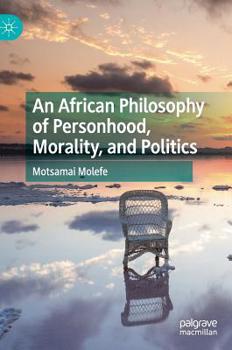An African Philosophy of Personhood, Morality, and Politics
Select Format
Select Condition 
Book Overview
1: Introduction
1.1: The Concepts of Personhood in African Philosophy
1.2: Developments in the Literature on Personhood
1.3: Themes and Structure of the Book
2: A Conceptual Mapping of Personhood
2.1: Introduction
2.2: Menkiti's Analysis of Personhood
2.3: Gyekye on Personhood
2.4: Matolino, Kaphagawani, and Ikuenobe on Personhood
2.5: Conclusion
3: An Exposition of Personhood as Moral Theory
3,1: Introduction
3.2: Being Human and Being a Person
3.3: Personhood Embodies a Character-Based Ethics
3.4: Means and Ends in Personhood
3.5: Humanism and the Instrumentality of Relationships
3.6: Rejection of Social Relationships as the Moral End
3.7: The Role of Relationships in Personhood
3.8: Conclusion
4: Personhood: Partiality or Impartiality
4.1: Introduction
4.2: Contextualising the debate Partiality and Impartiality in Moral Philosophy
4.3: Personhood: Partiality or Impartiality?
4.4: Conclusion
5: Personhood and Options in African Moral Thought
5.1: Introduction
5.2: Wiredu's Approach to Moral Philosophy
5.3: Tshivhase's Criticism of Personhood5.4: Conclusion
6: Personhood and Dignity in African Philosophy
6.1: Introduction
6.2: Ikuenobe's Conception of Dignity
6.3: Personhood and Dignity
6.4: Personhood, Partiality and Dignity
6.5: The Young and the Marginal Cases, and Dignity
6.6: Conclusion
7: Personhood as a Political Theory of Duties
7.1: Introduction
7.2: The Idea of Rights
7.3: Menkiti and Two Conceptions of Personhood
7.4: The Minimalist Conception of Personhood and Rights
7.5: The Maximalist Conception of Personhood and Duties
7.6: Conclusion





